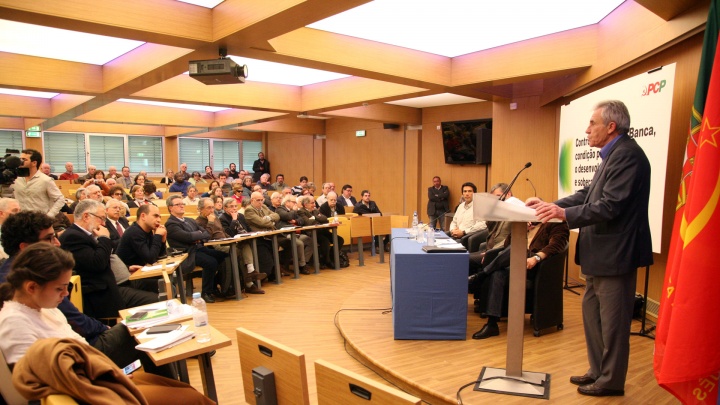Greetings to our guest and to all present in this seminar on «Public Management of the banking system, requirement for the development of national sovereignty», the first activity of a cycle which will run for the next two months and that means to approach debate and address some of the main constraints to the development of the country.
It is unquestionable that the country has been facing for a long time serious and complex problems which have been aggravated and have even progressively dragged the country into decline.
This escalation of the problems is very clear in lengthy situation of economic and social degradation of the country we have witnesses over the past years, resulting from the policies of deliberate impoverishment of the non-monopolistic classes.
A situation which has been dominated, among other characteristics by the deep deterioration of the national productive sector, the alarming economic recession and an enormous production and employment deficit, the accumulation of budget deficits of public and private investment, the unacceptable debt, the permanent bleeding of young human resources and the increase of poverty and social an regional inequality.
We believe that this situation, to be truly changed, needs a real rupture with the path followed so far by successive PSD, CDS and PS governments.
Without wasting any opportunity to restore the rights and income which the PCP is committed to, there is a particular need for a coherent and articulated process, for answers and solutions for a set of serious constraints created and fed by the right wing policies, that ate blocking and paralysing the development of the country, such as the debt and the debt servicing that mobilize resources in an unacceptable dimension, the results of the monetary integration on the Euro system and that which brings us here today and that comes from the financial domination of private banking.
In this new stage of the national political life, highlighted by the defeat of the PSD/CDS government and by the new correlation of forces in the National Assembly, these constraints and concerns need to be overcome by being face, aware that the longer it takes to address them the harder it will be to come to a solution.
It is now very clear that the private banking sector did not serve the interests of the country nor of the Portuguese.
Quite the opposite, it cared only about shareholder´s profits, not looking at any means, inclusive the most illegitimate and corrupt.
In fact, as we have mentioned previously, the private banking sector in Portugal, has never been part of any solution, on the contrary, it has always been a part of the country´s most serious problems. The privatisation of the banking sector, nationalised and developed since the April Revolution, was, and i tis, cause of unbalance, of instability, of economic and social degradation.
Unbalance, instability and degradation because it centred itself in the financial oligarchy, in the monopolistic capital, in the great economic powers and the capital monopolist and the great urban and rural ownership.
Because it disinvested and absorbed wealth from the product sectors, from the small and medium sized businesses for financial speculation, property bubble and the non-tradable markets of protected profit.
Because it introduced exploitative credit, an increase in charges, in spreads, in commissions, in abusive banking services which are disadvantageous to customers, to families, to micro end medium sized entrepreneurs, to farmers.
Because it channelled abroad considerable national resources, intensifying external dependency of the country and transferring wealth from the interior to the urbane coastal areas, deepening the internal poor planning of the territory.
Because it was unable to finance the economy having on the contrary decapitalised its own institutions, became dependent of public aid, damaged the State with the assistance and the loss of tax revenues, increased the deficit and the public debt, worsened the country´s financial situation, accumulated billions of Euro of private profit and public losses.
Because it enabled tax evasion, capital outflows, the access to offshores. It encouraged financial and public market deregulation and the privatisation of state business sector.
Because it misused public and community funding, attained unjustifiable tax benefits, plundered public and private assets and instigated income restrictions, instability and the destruction of jobs in the banking sector.
Because it financed and illegally privileged the respective corporate groups, hid accounts, multiplied partnerships to mislead monitoring, subjected itself to toxic assents, manipulated the markets, carried out adventurous, incompetent, damaging and even fraudulent management.
Because it got swamped in corruption, influence peddling, illegalities, wilful wrongs, appalling ethical behaviour, looting of personal and income and capital, illegal and obscure deals, in a pitiful succession of financial scandals which are in itself inseparable from contemporary monopolist capitalism.
Because it strengthened promiscuity with pressure and subordination of the political power along with the intense manipulation of public opinion.
No. We have said a thousand times, private banking is not part of the solution! It´s always been part of the country´s problems. Inequality and imbalances, social instability, degradation of the national situation, these were the natural, expected and confirmed of the creation, reinforcement and promotion of the private banking system instead of public banking.
Portugal needs a banking sector which instead of unbalance contributes to rectify the speculative bias of financial flow, the external dependency, the conflicts with the European Union, the regional differences, the social inequality.
Portugal needs a banking sector which instead of ensuring the stability and strengthening of profits of the great economic powers, of the high finance, of the lords of the money at the expense of workers families and the people´s unstable income, of unemployment, precariousness, living conditions and the rights of the citizens.
Portugal needs a banking sector which instead of forfeiting its sovereignty and aggravating its financial situation, defends its national autonomy and independence, its internal market, productive investment, the expansion and modernisation of its industrial capacity, creation of employment, economic growth, social development.
In a nutshell, Portugal needs to strengthen the public banking sector, in order to ensure public control and discipline the financial market, safeguarding the solvency and refocusing of the national banking sector.
Two things are becoming clear to the eyes of the people.
The first, is that there is a lot of ostentation in the private banking sector– and unfortunately PS does not disengage themselves from PSD and CDS in this thought – but the truth is that without the State, without the intervention of the State, without financial aid, without tax support and the State guarantees, the Portuguese banking system would be even weaker if not collapsed, as a result from this more management essentially geared towards the speculation and the systematic enhancement of shareholders´ capital.
A State involvement which has been strongly paid for by the people in general and by the workers of the banking sector in particular, victims of an option, orientation and practices which has led to the destruction of thousands of jobs, to the degradation of the working conditions and rights.
The necessity to restrain the large systematic risks which still exist for the economy, to stop further transferences of private losses to the Portuguese people, to ensure solvency, liquidity and the smooth functioning of the finance institutions, the need to ensure real regulation, monitoring and supervision of the banking sector, requires the public control of the finance system.
We demand that the compensation for damages suffered by private financial institutions, especially when caused by wrongful doing by their owns or representatives, its paid by their own capital and reserves and by using the resources, assets and estate of the relevant economic groups and main shareholders and not by public expenditure.
The second fact which is becoming clear, is the increasing trend of the banking sector being either public or foreign.
Transactional capital is increasingly prevailing and dominant in the sector, aggravating the transferal of wealth abroad and the country´s loss of sovereignty.
Privatizing financial institutions, leads, sooner or later, to its procurement or control by Europeans megabanks, purged from toxic assets and refinanced with public funds, as it is the case Banif´s handover to Santander.
A public banking sector is the only possibility to guarantee the public and national interests, to avoid wrongful orientation determined by transnational financial hubs, to limit the distortions of competition by the strong private banking core, to recover essential leverage for the sovereign development of the country.
With the Euro, the country lost its monetary sovereignty handing over the capacity to issue currency to the CEB, an external institution. With the privatisation and the progressive foreign governance of the banking sector, the external command centres are also in control of money creation by the commercial banking sector.
A problem, which, as we have mentioned, is exacerbated with the Banking Union and the so called “single supervisory mechanism” which is yet another unacceptable blow in national sovereignty and a political measure to expedite the process of centralisation and concentration of capital within the European Union aiming banks, mergers, concentration of deposits and investments in the great financial powers.
The new banking settlement mechanism, with the contribution of shareholders, creditors and wholesale deposits to the benefit of bailouts, instead of support provided by the State is another perplexity.
What we need is the political will and courage.
Single banking sector supervision and resolution further alienate the capacity of solving, in a way that we find more adequate to our reality, the hardship of Portuguese banks, weakening even more the capacity of the Portuguese State controlling the national banking system, increase the dependency and subjugation to ECB pressure, and even more seriously, stimulate the monopolistic domination of the great continental finance groups.
We don´t need a European single supervisory mechanism and of banking settlement to shift the costs of the banking system resolution on those responsible, the private owners and bank creditors.
We don´t need examples of regulation formatted by the ECB, driven by the standards of the big European banks, to stop Portuguese workers to be made to pay with their taxes the degradation of the public services and the flaws of the banking system.
As it´s been highlighted, and in a wider point of view, the need to bar financial speculation, to channel savings and resources to be invested in national production, to boost growth and defend the sovereignty, demands that the currency, credit and other essential financial activities are progressively switched to be under public domain and control, serving national interests.
With the increasing number of those who as we do defend a public solution for national banking, two opposite ideas, which we believe to be wrong have been instilled.
The new public institutions, of a significant dimension, such as the Novo Banco, which we have suggested to be totally nationalised, should not be integrated and converged in the CGD, leading the State banking sector a mega bank, nor the new public institutions should be split in a dismembered, irrelevant and inefficient set of regional banks.
We devise a public sector, progressively wider and reinforced, articulated and balanced, formed by distinct and autonomous well sized institutions, eventually with distinct geographic and operational expertise, maintaining amongst each other a certain rivalry and which alongside the remaining private, mixed or targeted segments of the finance under a greater public regulation, supervision and monitoring by the national authorities.
We learn with the valuable experience of nationalisation and development of the public corporate sector, which truth be said, despite its mistakes, the management and guidance of the right wing policies, contrasted with the continuous outflow of public resources used to cover the loopholes of the current private banking sector.
A great historical experience, which nevertheless the shortcomings and difficulties, showed that it is possible a reorganisation of the banking system, in the interests with interest of the national economy, the people and the country and not in the interests of the profit and accumulation of the national and foreign economic groups which exploit them.
The gradual expansion of the public banking sector can combine diverse paces and shapes.
These can be nationalisation, emergency interventions to defend the public interests, banking resolutions, negotiations, purchase of shareholdings in favourable conditions and eventual at a symbolic price. The path to rebuilding a powerful public finance sector is the reinforcement simultaneously quantitative with a raise in market shares and qualitative, with the liaison and refocusing of the system and a strong public regulation.
It is however essential that no opportunities are wasted. The definitive nationalisation of the Novo Banco, as proposed by the PCP at the National Assembly, provisionally allocated to the Resolution Fund, is in fact already paid for – by the contribution and state guarantee, the contribution of CGD and the loss of tax income from the banks which contribute to the Fund – would allow to increase clearly over 40% the position of the public sector in the banking market. Besides from safeguarding jobs, branches and the important role in financing small and medium size business, it would reassure depositors and consolidate the institution.
Nothing justifies, much less community law which in fact forbids it, subsidies by the Portuguese government, reflected in the difference between public aid and the income from a hasty sale to whatever private economic group, most certainly foreign, that bought the Novo Banco.
As it was mentioned in the opening speech, the problem is not in choosing from capital from this country or other, as main actor or in exclusivity, nor in the negotiated and concerted split of the banking market amongst economic groups. The problem is the control of these groups and capital over the national banking sector.
The Portuguese people do not have to and should not have to pay to the big transnational banking sharks the handover of institutions restructured with public funds. This was the case of the recent purchase of Banif by Santander, which in fact was its recapitalisation at the expense of the public funds drained on it.
The Portuguese state does not have to keep the losses and furthermore lose the banks.
Portugal needs to prepare and materialise a different path. It needs different solutions to its problems. It needs to free itself from the ties of subjugation and enslavement.
As a matter of fact, nothing can force Portugal to accept the position of subordinate state and alienate its Independence and national sovereignty by renouncing the right of choosing through its own socio-economic structures.
We truly believe that Portugal is not doomed to backwardness. It is possible and necessary to follow other policies, reversing the path followed so far. There are proposals, and many of those have been presented today, highlighting the existence of a policy alternative to the right wing policies, capable to solve the problems of the country at development level.




